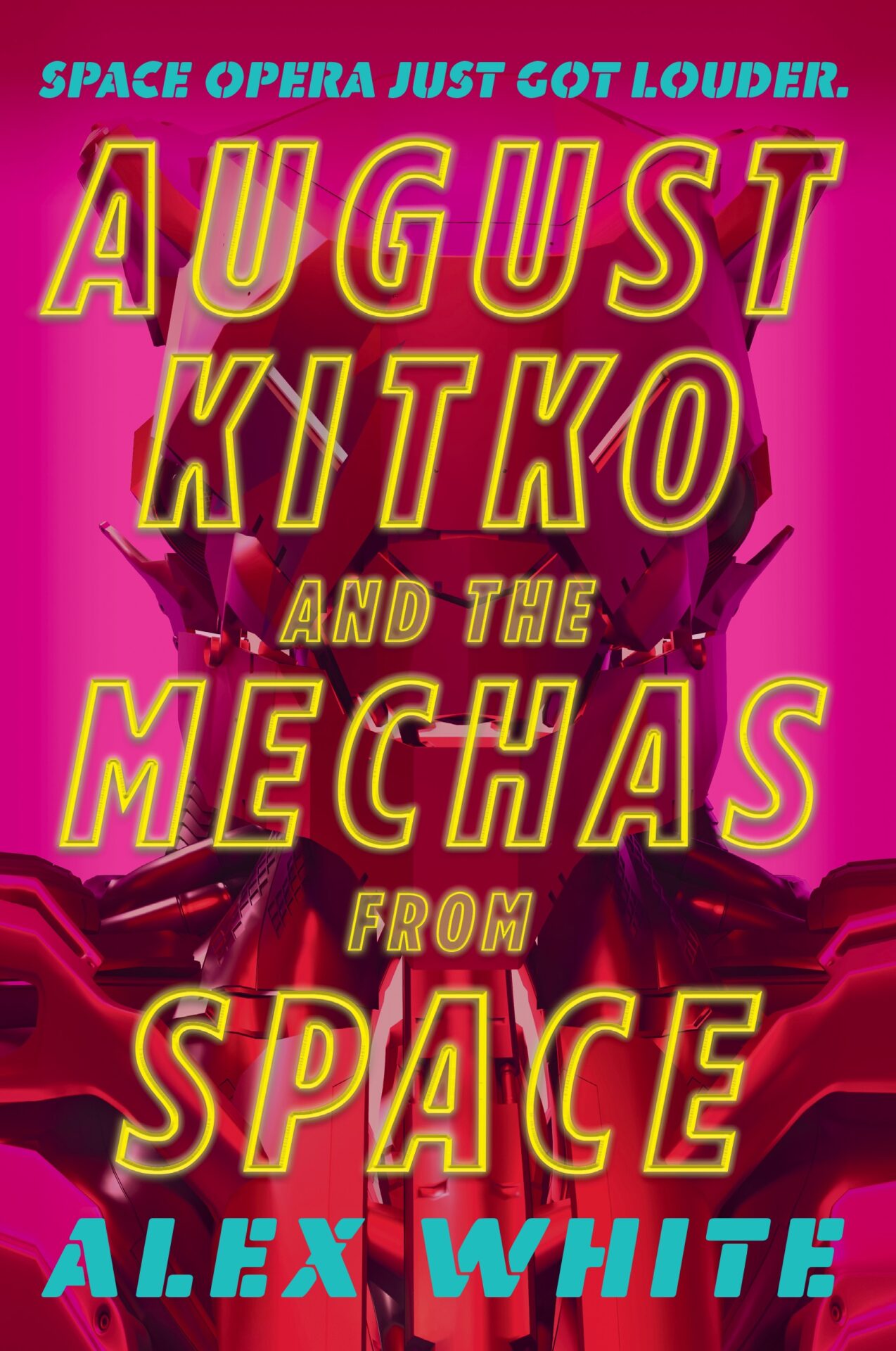
Alex White is joining us today to talk about their novel, August Kitko and the Mechas From Space. Here’s the publisher’s description:
When an army of giant robot AIs threatens to devastate Earth, a virtuoso pianist becomes humanity’s last hope in this bold, lightning-paced, technicolor new space opera series from the author of A Big Ship at the Edge of the Universe.
Jazz pianist Gus Kitko expected to spend his final moments on Earth playing piano at the greatest goodbye party of all time, and maybe kissing rockstar Ardent Violet, before the last of humanity is wiped out forever by the Vanguards–ultra-powerful robots from the dark heart of space, hell-bent on destroying humanity for reasons none can divine.
But when the Vanguards arrive, the unthinkable happens–the mecha that should be killing Gus instead saves him. Suddenly, Gus’s swan song becomes humanity’s encore, as he is chosen to join a small group of traitorous Vanguards and their pilots dedicated to saving humanity.
What’s Alex’s favorite bit?

ALEX WHITE
It’s no secret that I love user experience (or UX)—the process of creating interfaces that are clear, empowering and satisfying. I’ve been a UXer for a long time inside the tech industry, working on everything from hardened satellite communications to smart cities. I love sci-fi movies, especially seeing what VFX artists envision for human interaction. Most of the time, it’s a usability/accessibility nightmare of digital clutter, but I’m always here for it.
(For our purposes, an interface is anything a person uses to enact their will over something. A keyboard is a computer interface. A handle is a door interface. Phone support is a corporate interface.)
I wanted AUGUST KITKO & THE MECHAS FROM SPACE (hereafter, “AKMFS”) to take place in what I call the Sparklefuture—an era of clean tech like we see in shows such as Star Trek. In those worlds, the computers are polite, every piece of data is available, and the floors are all vacuumed. The level of tech is ubiquitous, usually because manufacturing has exploded. If I wanted to create my own believable Sparklefuture, I needed some tech design rules.
- Processing, sensors, motors, displays and energy storage are all commodified and nanoscale (“Sensors” here covers cameras, microphones, antennas, etc.).
- “The best interface is no interface.”
- Accessibility is the key to our future.
Everything is cheap, tiny and unlimited.
The smaller and cheaper electronics become, the more ubiquitous they’ll be. The more something is manufactured, the more advanced and affordable it gets. Sensor resolution will continue to improve because there’s not an upper limit on the detail of our analog reality. AKMFS, which takes place about 600 years in the future, takes these ideas to an extreme.
Almost every room contains inherent user interfaces like media projection, comms, climate control, etc. Any fabrics double as wearables, and might be dynamically luminous or colorful, or even actuated (so the fashion is absolutely wild). These systems are standard features of the characters’ landscape, with minor specialization based on context.
Calm Technology Prevails
Golden Krishna coined the phrase, “The best interface is no interface.” Let’s take the thermostat, for example. When you aren’t comfortable, you adjust it the knob. Maybe yours is from the future and comes with a fancy screen. No matter how you interact with it, it’s not something you want to do. The superior thermostat is the one that keeps you comfortable enough that you don’t notice it. This is an extension of Calm Technology, which posits that our devices should enable us, never distract us.
Good UX satisfies you while asking as little as possible in return.
The interfaces of AKMFS are designed to be unobtrusive from both an interaction and social perspective. If you want the computer’s attention, you don’t shout for it like Star Trek, you throw a sign. If you receive a message, you might get a light tap on the shoulder from your actuweave shirt, not a buzz or ringtone, and you could read it on the fabric of your sleeve. Doors know who you are, and whether you’re supposed to enter them. The light switch is mostly useless, replaced with a series of room protocols based on the situation. It has built-in routines for if you’re asleep, if you’re working or relaxing, and can figure that out based on occupant behaviors.
Accessibility is paramount.
Innovations on behalf of disabled people regularly yield massive benefits for ableds. For instance, Alexa and Siri would not exist if the internet had not been reformatted for accessibility standards. “Headless UIs” weren’t a foregone conclusion during the heyday of Flash, which couldn’t be read by screen readers.
All interfaces in AKMFS are “input agnostic,” meaning that you interact with them however you’re capable of doing. If you can’t speak and want to turn on some media, you can sign for it. If you don’t have hands, ask aloud. And if you’re dealing with a combination of difficulties, the unlimited customization of systems will enable you to meet your objectives. Every interface must be reconfigurable, from the morning news feed to the steering wheel on a boat.
We’re already seeing this intent to customize everything on a smaller scale in our world.
“Indistinguishable from magic”
Technology is supposed to enable us (or apparently to enable others to spy on us). I know I’m the millionth person to use the Clarke quote, but I’d like to take it a step further. Advanced tech isn’t only arcane because its workings are unknowable to the ignorant—but because its use turns us into motherfucking wizards. True enablement is to enact one’s will upon their environment, sparing no effort save an expression of desire. It’s telekinesis and enchantment, and it feels that way. This is where I part ways with Calm Tech and Golden Krishna. I want to notice my experiences and could go for some light special effects in my life.
There’s another form of magic at play when we make room at the table for everyone. Belonging in all contexts of our daily lives is important to our emotional wellbeing, and experiencing that is powerful. The innovations and cultures that spring from accessibility can’t be overstated.
I loved ruminating on these principles, and what a future might look like where we mastered them. That must be why the UX of AKMFS is My Favorite Bit.
LINKS:
August Kitko and the Mechas From Space Universal Book Link
BIO:
Alex White writes genre-bending, cinematic sci-fi novels set in well-known franchises and original worlds. They wrote the critically-acclaimed Salvagers series, as well as The Starmetal Symphony Trilogy. Their Aliens novels are THE COLD FORGE and INTO CHARYBDIS. They also wrote the Jadzia Dax-centered thriller, STAR TREK DS9: REVENANT.
